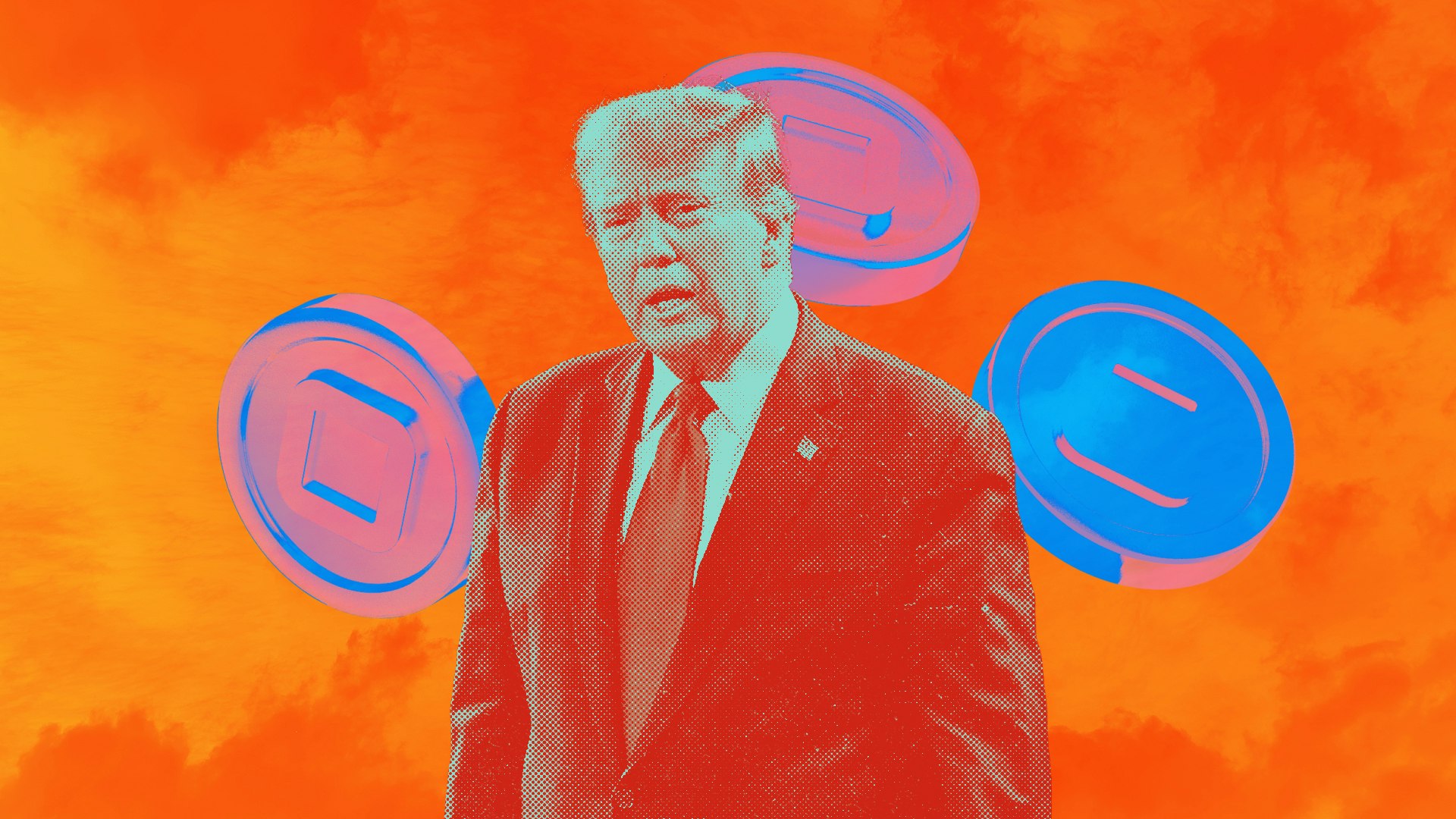Trump's Executive Order: What It Means for Crypto and Your 401(k)
401ks and IRAs: Not a hugely romantic subject but here’s how cryptocurrency could become part of your retirement savings.
In this article...
- A new Executive Order by US President Donald Trump could clear the way for 401ks to be used to buy cryptocurrency.
- Working people can still invest in cryptocurrencies outside of their 401ks, using crypto exchanges.
- Here’s everything you need to know about this new development in the crypto world.

On August 7, 2025, President Donald Trump signed an executive order that could change how Americans save for retirement. For the first time, this order opens the door for working people to invest their 401(k) retirement money in cryptocurrency, along with other alternative investments like real estate and private equity.
What's a 401(k) Again?
A 401(k) is a retirement savings account that many employers offer their workers. It is an account where you put aside money from each paycheck for your future retirement. Your employer often matches some of what you contribute and adds it to your account.
Currently, most 401(k) plans only let you invest in traditional options like mutual funds and stock market funds. This new executive order could change that by allowing crypto investments too.
What Did Trump's Executive Order Actually Do?
The executive order directs the U.S. Secretary of Labor to review current rules about what investments are allowed in 401(k) accounts, specifically looking at alternative assets like cryptocurrency.
In simple terms, Trump asked the Department of Labor to reconsider the rules that currently make it difficult for 401(k) plans to offer crypto investments. The order doesn't immediately change anything. It's more like asking officials to study whether the current restrictions make sense.
Americans have roughly $9 trillion stored in 401(k) accounts. That's an enormous amount of money that could potentially flow into cryptocurrency if these new rules take effect.
As Galaxy CEO Michael Novogratz said, "That's a monster pool of capital". This amount of money being freed up, could drive significant adoption of digital assets.
How Would This Actually Work?
There are differences between types of retirement accounts.
Most 401(k) Plans: Limited Options
Most people have employer-sponsored 401(k) plans through their job. These plans are managed by big financial institutions. Any crypto investments would be via the financial institution, and would probably be in the form of cryptocurrency ETFs (exchange-traded funds). These are funds that workers can invest in, without having to buy or hold the crypto. The financial institution would manage them for the worker.
Self-Directed Options: More Flexibility
Some people, especially those who are self-employed, have access to "solo 401(k)" plans or self-directed IRAs. These accounts offer more investment flexibility and could potentially allow direct cryptocurrency investments.
Self-directed IRAs, in particular, give workers more control over their investment choices. However, they require working with custodians and often setting up additional legal entities to manage the investments.
What's Most Likely to Happen?
While the executive order opens doors, the reality is that most increased retirement investment in crypto will probably happen through regulated products like spot Bitcoin ETFs, managed by large institutions, rather than direct ownership of digital coins.
The executive order focuses on making it easier for the people legally responsible for managing retirement funds to offer these investments.
Since cryptocurrency isn't directly regulated by the SEC in the same way as stocks, most of the new investment will likely flow toward crypto ETFs and other established investment products that are already approved by regulators.
What This Means for Crypto Prices
The announcement had an immediate impact on cryptocurrency markets. The Bitcoin price rose slightly in the days following news of the executive order.
This reaction shows that investors believe easier access to crypto through retirement accounts could drive new demand for digital assets.
Important Things to Consider
Before getting too excited about crypto in your 401(k), you need to keep some things in mind.
It's Not Immediate.
This executive order is just the first step. It will take time for the Department of Labor to review rules and for employers to potentially add crypto options to their 401(k) plans.
Risks Still Apply
Cryptocurrency remains a volatile investment. While it has potential for high returns, it can also lose value quickly. Retirement savings require careful consideration of risk.
Limited Control
If your employer does add crypto options to your 401(k), you likely won't own cryptocurrency directly. Instead, you'll probably own shares in funds that invest in crypto.
Fees Matter
Alternative investments often come with higher fees than traditional retirement investments. Make sure you understand all costs before investing.
Final Brain Nuggets
Trump's executive order represents a significant shift toward mainstream acceptance of cryptocurrency as a legitimate investment option. By potentially allowing crypto in 401(k) plans, millions of American workers could gain easy access to digital assets through their workplace retirement accounts.
However, this is still early days. The executive order asks for a review of current rules rather than immediately changing them. Whether and how quickly crypto becomes available in your specific 401(k) will depend on regulatory changes, your employer's decisions, and the investment options they choose to offer.
For now, if you're interested in crypto investing, you can still explore other options like buying cryptocurrency directly through established exchanges.
The key is to approach any crypto investment as part of a diversified retirement strategy, understanding both the potential benefits and risks involved.
Disclaimer
The information provided on this website is for educational and informational purposes only and should not be construed as financial, investment, tax, or legal advice. We are not licensed financial advisors, registered investment advisors, brokers, or tax professionals.
Any discussions of 401(k) plans, self-directed 401(k)s, or retirement strategies are general in nature and may not apply to your specific situation. Before making any decisions regarding your retirement accounts or investments, you should consult with a qualified financial advisor, tax professional, or attorney who is familiar with your individual circumstances.
We make no guarantees as to the accuracy, completeness, or timeliness of the information provided. All investments involve risk, including the potential loss of principal. Past performance is not indicative of future results.
By using this website, you acknowledge and agree that you are solely responsible for your own financial decisions.

Suggested Articles

MKR → SKY, DAI → USDS: The Next Generation of Tokens
What is going on with Maker (MKR) and Dai (DAI)? And what is Sky (SKY) and what is USDS? Here is everything you need to know.Read more
What Can I Buy with Crypto? A Guide to Spending Digital Assets
From coffee to cars, here is how to turn your digital portfolio into real-world purchasing power. Read more
The Crypto Ecosystem: A Guide to Different Types of Cryptocurrency
From stablecoins to utility tokens, here is how to tell the difference between the thousands of digital assets on the market.Read moreBrowse by topic
CoinJar’s digital currency exchange services are operated by CoinJar Australia Pty Ltd ACN 648 570 807, a registered digital currency exchange provider with AUSTRAC.
CoinJar Card is a prepaid Mastercard issued by EML Payment Solutions Limited ABN 30 131 436 532 AFSL 404131 pursuant to license by Mastercard. CoinJar Australia Pty Ltd is an authorised representative of EML Payment Solutions Limited (AR No 1290193). We recommend you consider the Product Disclosure Statement and Target Market Determination before making any decision to acquire the product. Mastercard and the circles design are registered trademarks of Mastercard International Incorporated.
Google Pay is a trademark of Google LLC. Apple Pay is a trademark of Apple Inc.
This site is protected by reCAPTCHA and the Google Privacy Policy and Terms of Service apply.

